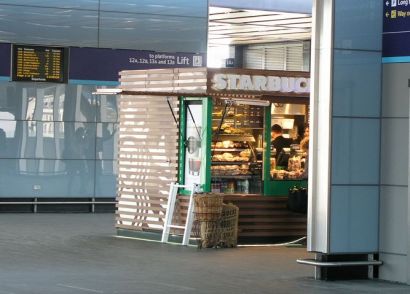PLANS to transfer the management of Reading and Bristol Temple Meads stations from First Great Western to Network Rail are being developed, but no decisions have yet been made.
Network Rail has moved to deny reports that the deal is already done, but even so it has taken over the letting of retail units at Reading, which is being modernised and enlarged by the addition of five more platforms. The company is letting the space because it says there is an 'aspiration' at the Department for Transport for both Reading and Bristol Temple Meads to become Network Rail-managed stations from next April.
A major overbridge with room for retail space was opened at Reading earlier this year as one phase of the station's development was completed, and all the signs at the modernised station already follow the standard Network Rail style.
Network Rail said that Hotel Chocolat, Boots, The Cornish Pasty Co, Upper Crust, Cards Galore and Oliver Bonas 'are all primed to start work on units in the newly constructed part of the station'. The new retailers will join a small Starbucks unit which has been on the overbridge since it opened in April this year.
Hamish Kiernan, Network Rail’s interim commercial director, said: "Reading station is bigger and better than ever, but we know passengers want more retail choices in the new part of the station. We are pleased to be able to announce that the new stores will be ready to welcome customers from April 2014."
Retail sales in Network Rail stations have continued to defy trends in the high street. The company said in September there was 6.4 per cent growth in like-for-like sales from April to June 2013, while high street sales for the same period were just 0.4 per cent.
The work at Reading should be complete by 2015, when a 2km flyover will be opened west of the station to reduce conflicting movements on the Great Western Main Line.
Network Rail inherited the management of a number of major stations from Railtrack in 2001-2. Stations like London Euston, Leeds, Manchester Piccadilly and Glasgow Central were never managed by franchises because at privatisation it was envisaged that stations like these would be sold and become independent, like airports. However, the plans for the creation of 'independent station operators' were later dropped.


